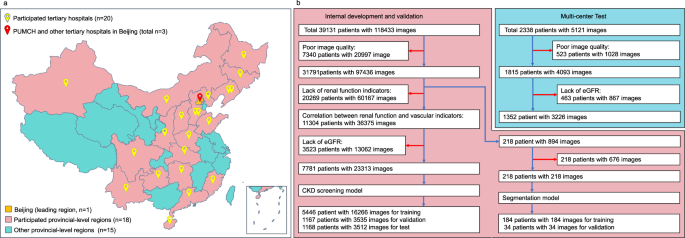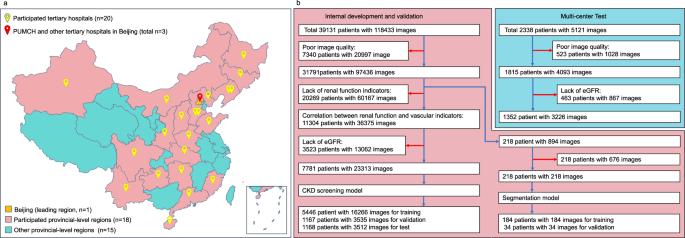Screening chronic kidney disease through deep learning utilizing ultra-wide-field fundus images
IF 12.4
1区 医学
Q1 HEALTH CARE SCIENCES & SERVICES
引用次数: 0
Abstract
To address challenges in screening for chronic kidney disease (CKD), we devised a deep learning-based CKD screening model named UWF-CKDS. It utilizes ultra-wide-field (UWF) fundus images to predict the presence of CKD. We validated the model with data from 23 tertiary hospitals across China. Retinal vessels and retinal microvascular parameters (RMPs) were extracted to enhance model interpretability, which revealed a significant correlation between renal function and RMPs. UWF-CKDS, utilizing UWF images, RMPs, and relevant medical history, can accurately determine CKD status. Importantly, UWF-CKDS exhibited superior performance compared to CTR-CKDS, a model developed using the central region (CTR) cropped from UWF images, underscoring the contribution of the peripheral retina in predicting renal function. The study presents UWF-CKDS as a highly implementable method for large-scale and accurate CKD screening at the population level.


通过深度学习利用超宽视场眼底图像筛查慢性肾病
为了应对慢性肾脏病(CKD)筛查方面的挑战,我们设计了一种基于深度学习的慢性肾脏病筛查模型,名为 UWF-CKDS。它利用超宽视场(UWF)眼底图像来预测是否存在慢性肾脏病。我们利用来自全国 23 家三甲医院的数据对该模型进行了验证。为了提高模型的可解释性,我们提取了视网膜血管和视网膜微血管参数(RMPs),结果显示肾功能和 RMPs 之间存在显著相关性。利用 UWF 图像、RMPs 和相关病史,UWF-CKDS 可以准确判断 CKD 状态。重要的是,UWF-CKDS 的性能优于 CTR-CKDS,后者是利用从 UWF 图像中剪切出的中心区域(CTR)开发的模型,强调了外周视网膜在预测肾功能方面的贡献。这项研究表明,UWF-CKDS 是一种高度可实施的方法,可用于大规模、准确的人群慢性肾脏病筛查。
本文章由计算机程序翻译,如有差异,请以英文原文为准。
求助全文
约1分钟内获得全文
求助全文
来源期刊

NPJ Digital Medicine
Multiple-
CiteScore
25.10
自引率
3.30%
发文量
170
审稿时长
15 weeks
期刊介绍:
npj Digital Medicine is an online open-access journal that focuses on publishing peer-reviewed research in the field of digital medicine. The journal covers various aspects of digital medicine, including the application and implementation of digital and mobile technologies in clinical settings, virtual healthcare, and the use of artificial intelligence and informatics.
The primary goal of the journal is to support innovation and the advancement of healthcare through the integration of new digital and mobile technologies. When determining if a manuscript is suitable for publication, the journal considers four important criteria: novelty, clinical relevance, scientific rigor, and digital innovation.
 求助内容:
求助内容: 应助结果提醒方式:
应助结果提醒方式:


